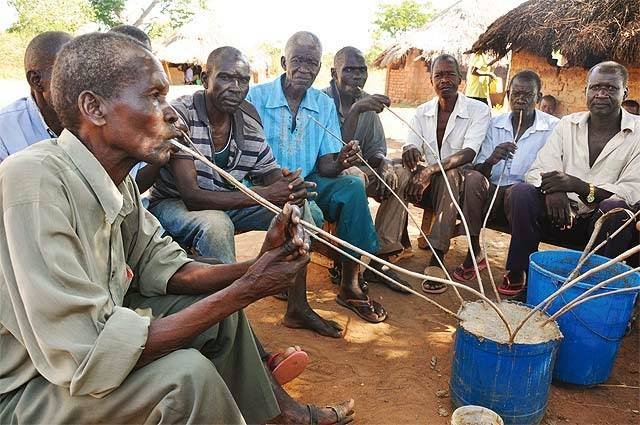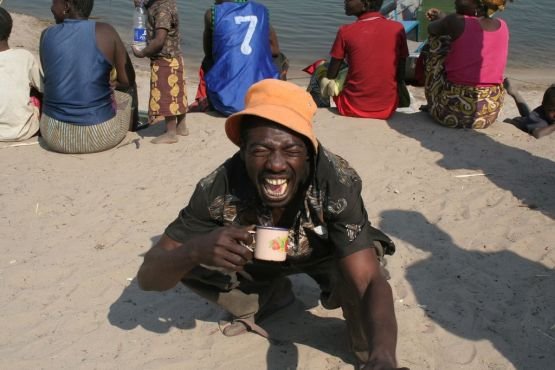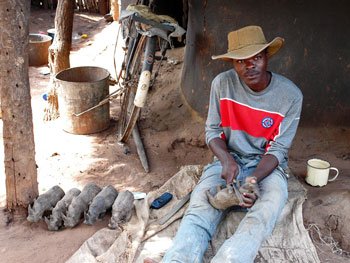The World Health Organization publishes annual reports on the level of alcohol consumption per capita in various countries around the world. To the surprise of many, over the past three years in the ranking of the world's most drinkers in the lead African countries: Chad, the Gambia and Mali. And this is despite the fact that most of the citizens of these countries profess Islam, which prohibits alcohol.

Attachment to hot drinks is typical for other countries of the continent. Experts argue that Africa has faced a terrible problem than the Ebola virus or AIDS: alcoholism has affected virtually all social and age groups. The reason - the availability of alcoholic beverages, both industrial and domestic production.

In Cote d'Ivoire, alcohol can be bought everywhere: in stores, kiosks, on trays, day and night. Trade is also carried out along the motorways, where special sales outlets are located, offering a hot, mainly, of course, surrogate. Can and in the flood. No tare with you - no problem, the seller will pour you in a plastic bag as much as necessary.

In Ouagadougou, the capital of neighboring Burkina Faso, there are four thousand licensed drinking establishments. That is, one for every 500 citizens, including babies, old people and women. The very amount is already a violation of the law. It should be four times less. However, no one pays any attention to this. As well as the widespread unsanitary conditions. What exactly pour in many bars, no one will say. Here the consequences of drinking alcohol are preferred not to think. "Drunkenness is proof of the love of alcohol. We love him to death, "the habitue of one of the taverns shared his worldview.

Owners of drinking points, realizing that they pour the visitors, call their institutions according to: "Morgue", "Coma", "Emergency situation". Hide from the authorities do not even think - bars and eateries with steamed alcohol work in the most crowded places in the city.
In Tanzania, Cote d'Ivoire, Cameroon, Senegal, Rwanda, Malawi and some other countries, "packets" are very popular: alcohol, poured into plastic containers in volume from 50 to 200 milliliters. It looks like a disposable shampoo pack from the hotel.

"Sachet" is a mere pittance, even by African standards - about 15 euro cents (about 10 rubles). This is called a "glass for the poor." But not only the poor are buying them. The popularity of this product is such that often on sales it bypasses drinking water. A significant part of buyers are schoolchildren and students.
The authorities are trying to fight the widespread spread of "packets", forbidding them to trade near schools, colleges and other places where young people gather. But due to the weakness of the controlling bodies, these restrictions are almost not observed. "Even if representatives of the trade inspection come, we can say that we are not aware of the ban. If they dig up, we give them a little of our goods, and they leave, "said the hostess of one of the shops in Cameroon.

They are poisoned with steamed alcohol in Africa all the time. In April 2014, 80 people were killed in various parts of Kenya, 150 were hospitalized. The killer is "changa", moonshine on corn or sorghum. Because of its cheapness, this drink is extremely popular with the local population. Mass poisoning was caused by the fact that manufacturers added methanol to the finished product in order to "increase the degree".
In August 2015 in Cameroon, 21 people lost the life of "odontol". Produced illegally from palm wine, bark of trees and a number of other ingredients. A poison, poisonous to humans, was formed as a result of a chemical reaction into which these very unknown components entered. "The alcohol content of the liquid on the label is not indicated. How it was made, too, remains a mystery, "- said one of the experts during the investigation.

The authorities immediately after the tragedy tried to ban the "odontol". At a meeting with local leaders, the head of the region demanded urgent action, as well as informing law enforcement authorities about known points of production and distribution of the drink. But it was not there. "No one will tell them anything. My mother earned money on "odontol", which was enough for my education. Now I work in the hospital ", - stated the manager of one of the local clinics.
The chain from the producer to the consumer of the drink looks like this: in the jungle there is an illegal distillery. Ready-made products are bought by wholesalers and daily distributed in smaller lots to 30 liters by traders in different villages. And they already sell alcohol at retail. According to police estimates, the profitability of this business is 30 percent.

Experts explain the increasing addiction of Africans to alcohol by completely traditional reasons: in countries the standard of living falls, people seek "salvation in wine". But there is one more important nuance: the use of alcohol, especially among African youth, has become fashionable. And this break is very difficult.
Good read !!.